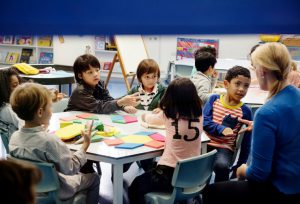Play is often considered a fun and engaging activity for children, but its significance goes far beyond mere entertainment. Play-based learning has emerged as a powerful tool in early childhood education, contributing immensely to cognitive development. At Seedling Modern High School, we believe in the integration of play as a core aspect of learning, knowing its profound effects on a child’s growth.
The Science Behind Play-Based Learning
Cognitive development refers to the way children think, explore, and figure things out. It encompasses skills such as memory, problem-solving, decision-making, and learning ability. Research shows that children engaged in play-based learning activities develop better cognitive abilities compared to those who rely solely on traditional, instructional methods.
During play, children actively engage their brains in ways that traditional classroom settings may not encourage. Activities such as building blocks, pretend play, or puzzle-solving challenge their thinking and allow them to experiment, explore, and discover new solutions. These forms of play stimulate the brain’s neural pathways, supporting the development of executive functions, including critical thinking and self-regulation.
Enhancing Creativity and Problem-Solving
Play-based learning fosters creativity by allowing children to think beyond predefined boundaries. Whether through imaginative role play or constructing objects from various materials, children develop the ability to approach problems in innovative ways. This kind of unstructured play helps them understand cause and effect, enhancing their capacity for problem-solving—a key cognitive skill.
For example, when children play pretend games such as “house” or “doctor,” they are not just mimicking adults. They are learning how to communicate, make decisions, and solve problems within those roles. This prepares them for real-life situations by practicing complex thinking in a simplified environment.
Social and Emotional Learning
Cognitive development is not only about how children think but also about how they interact with others. Play-based learning naturally encourages social interaction, which helps children develop their language skills, emotional understanding, and empathy. Whether playing in groups or pairs, children learn to share, negotiate, and collaborate, all while boosting their ability to focus and manage their emotions.
These social experiences further enhance cognitive flexibility, helping children adapt to different situations and perspectives. This adaptability is crucial for lifelong learning and personal development.

Play and Academic Success
Many parents and educators wonder if play-based learning can also lead to academic success. The answer is a resounding yes. It is seen in our Seedling Modern High School that children who engage in meaningful play often outperform their peers in areas such as literacy, numeracy, and science. The reason lies in the active engagement that play promotes, which enhances memory retention and understanding of complex concepts.
For instance, Seedling Modern High School through building blocks or interactive storytelling, children learn foundational math skills like counting and geometry without even realizing it. Similarly, play-based activities that incorporate language help develop early literacy skills, such as vocabulary building and sentence structure.
Conclusion
At Seedling Modern High School, we recognize that play-based learning is not just an extracurricular activity but an essential part of cognitive development. By integrating play into the educational process, we help children develop the cognitive, social, and emotional skills they need to succeed both in school and in life. Play is, indeed, the foundation upon which lifelong learners are built.
So, let’s continue to nurture a play-rich environment where learning is joyful, engaging, and, most importantly, impactful for every child’s cognitive growth!
